A follow-up to our dream sequence feature , here’s a selection of films that never happened because they were all a dream (allegedly) or just someone’s flight of fancy…
Invaders From Mars (1953)
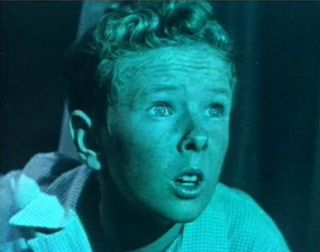
The “plot”: Young boy in a small US town sees a spaceship crash land, and then witnesses everyone he knows being taken over by aliens.
The plot device: Classic “and it was all a dream” stuff. Just as all Hell breaks loose, with the army shooting missiles as the aliens, we never find out if humanity wins this war of the worlds, because young David wakes up. Swizz!
Cheese before bed? Almost certainly, if the Martian leader is anything to go by – a large, silent, disembodied head with blank, rolling eyes and tentacles emerging from each side.
Any hints it’s more than just a flight of fancy? You bet. After David’s parents calm him down, he goes back to his bedroom and watches through the window as the same spaceship crash lands again. Is that what they call a recurring nightmare?
Here we go again: The 1986 Tobe Hooper-directed remake dispensed with this whole dream shtick.
.
Sign up to the SFX Newsletter
Get sneak previews, exclusive competitions and details of special events each month!
.
Jacob’s Ladder (1990)
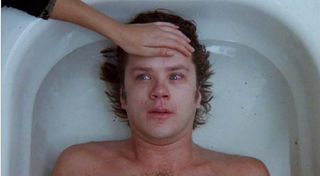
The “plot”: US soldier Jacob Singer (apparently) survives being gutted by a bayonet during the Vietnam War, but then, years later, when he’s back in New York, he starts having hallucinations about his dead son and being chased by demons.
The plot device: Of course he didn’t survive the gutting. He’s been dead all along and in some kind of limbo/purgatory induced by an experimental drug being used by the military.
Cheese before bed? Absolutely. Although Jacob’s hallucination starts off mundane enough, things soon escalate into true nightmare territory, with blurry-headed people, gruesome, malformed creatures and hospitals in desperate need of a deep clean, where they don’t use anesthetic when operating.
Any hints it’s more than just a flight of fancy? No. Unless you think purgatory really is like this.
.
.
Labyrinth (1986)
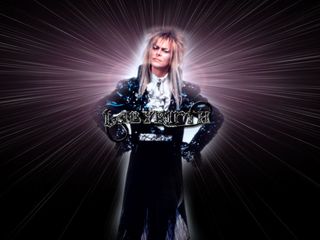
The “plot”: Teenager Sarah turns out to be the worst babysitter in the world when she lets the Goblin King kidnap her baby brother and torture him by singing really bad David Bowie songs to him. She has to enter the Muppet-infested Labyrinth to get him back.
The plot device: Sarah wakes up in a room full of her toys, which are strangely reminiscent of the creatures she’s encountered in the Labyrinth.
Cheese before bed? Oh yes. A pit full of “helping” hands that form into faces that can talk; trolls; talking dogs; talking door knockers; fire sprites that can detach bits of their body; castle interior design by M Escher, to name but a few… Oh, and an overriding implication that the whole thing is some metaphor for Sarah’s interior struggle between her blossoming womanhood and her reluctance to leave childish things behind. Yeah, you thought it was just a kids’ film, but it’s actually Muppet soft porn.
Any hints it’s more than just a flight of fancy? Absolutely. After Sarah wakes up thinking it’s all been a dream, all her Muppet mates suddenly appear in her room and they have a big knees up. Or maybe it’s just another metaphor – sod leaving childish things behind and PARTY!
.
.
The Princess Bride (1987)
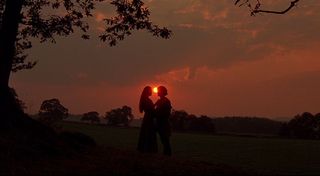
The “plot”: The beautiful Buttercup is kidnapped and held against her will by the evil Prince Humperdinck who intends to marry her. Her childhood sweetheart, Westley, who’s now the Dread Pirate Roberts, sets out to save her.
The plot device: It’s a fairy story being read by a grandfather to his (initially bored) grandson.
Cheese before bed? Well, that’s what the grandson thinks he’s getting, in the form of some cheesy, romantic nonsense his grandadad insists on reading him. Pretty soon, though, he’s rapt with this tale of derring-do, fire-swamps and rodents of unusual size.
Any hints it’s more than just a flight of fancy? Nah. But it’s still great.
.
.
Alice In Wonderland (1951)
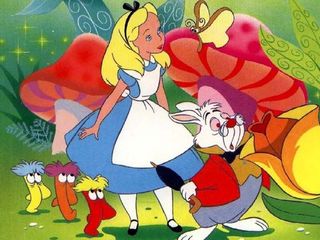
The “plot”: Girl falls down a rabbit hole into a fantasy land where things get curiouser and curiouser.
The plot device: Alice wakes up at the end of the film, and it was all a dream. This device, however, was not used in Lewis Carroll’s original book, where Alice was clearly simply out of her skull on absinthe. Curiously, it’s hard to determine at the start of the Disney film when Alice actually falls asleep. The best bet is when lays down in a patch of daisies, but she’s slap bang in the middle of a singing a song at that point, so that would be some feat.
Cheese before bed? Cheddar of the highest quality: Mad Hatters; walking, talking playing cards; teleporting cats; growing and shrinking potions; and Bill the Lizard chimney sweep.
Any hints it’s more than just a flight of fancy? Nope.
.
.
Vanilla Sky (2001)
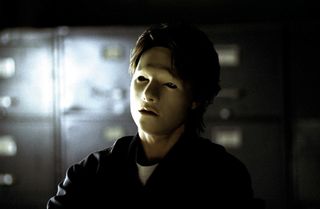
The “plot”: A cocky millionaire playboy, David, who is obsessed with a Spanish beauty and stalked by his ex, has his world turned upside when he’s in a car crash that ruins his good looks. But that’s nothing compared to the fact that his life seems all jumbled up and he’s having very odd dreams that seem to be crossing over with reality.
The plot device: It’s an alien zoo! Oh, erm, no, it’s that other SF standby that only seems cool to people who’ve never read any science fiction: David is in cryogenic sleep with a lucid dreaming option that’s gone on the fritz. See also Life On Mars , US flavour.
Cheese before bed? A completely deserted New York’s Times Square; sudden inexplicable girlfriend swapping; a dog that comes back to life; a dive from a skyscraper… yep, there’s dream logic at work here.
Any hints it’s more than just a flight of fancy? Possibly, if you can be arsed to pay attention enough to pick out what’s real and what’s not. Most of the audience has slipped into cryogenic sleep themselves by about a third of the way in.
.
.
Total Recall (1990)
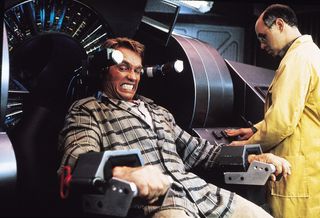
The “plot”: A man who fantasises about being a spy uses the facilities at Rekall to have false memories implanted in his head of being a secret agent on Mars.
The plot device: This one’s complicated (and intriguingly so). Rekall clearly creates false memories, but it’s near impossible to know which bits of the film are “real” memories and which bits are “false” memories. There’s the possibility the entire film is false memory; certainly it was director Paul Verhoeven’s intention that even the early scenes – before Douglas Quaid appears to go to Rekall for the first time – could be left open to interpretation. You kinda hope the ending is a false memory, because it’s very, very silly.
Cheese before bed? Three-breasted prostitutes; a mutant oracle embedded like a half-formed foetus in the stomach of his brother; Mars being terraformed in less time than it takes to mow the lawn in the garden of a small terraced house in Cleethorpes.
Any hints it’s more than just a flight of fancy? Your guess is as good as ours.
Here we go again: The 2012 Len Wiseman-directed remake similarly refuses to tell the audience explicitly what’s real and what’s not, though on the DVD commentary Wiseman said he had to know in his own head which version of Quaid’s reality was “real” to make the film.
.
.
Robot Monster (1953)
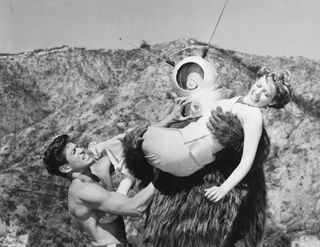
The “plot”: A deep sea diver in a gorilla suit is sent to Earth to kill off the last six surviving humans after an alien invasion that involves a lot of stock footage.
The plot device: One of the survivors, a boy, has actually dreamt the whole thing after being hit by lightning. Anybody who’s seen this will wish they’d dreamt the whole thing as well.
Cheese before bed? Lots of lizards with fins stuck on them romping around the kind of fake landscapes that would get you laughed out of the Hornby Double O Gauge Train Set Society. Oh, and a deep sea diving primate that can pick up Freeview.
Any hints it’s more than just a flight of fancy? After the boy has woken up in a cave mouth and wandered off into the sunset, the camera tracks into the cave and the Robot Monster looms up out of the shadows. Good grief, did they think there was a chance of a sequel?
.
The Wizard Of Oz (1939)
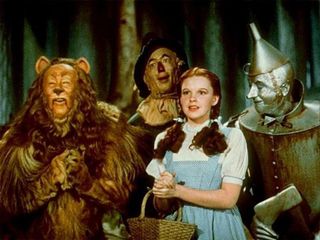
The “plot”: A girl, Dorothy Gale, is taken somewhere over the rainbow via Hurricane Express to a land where battling witches daren’t leave the house when it’s raining.
The plot device: It’s another one of those “it was all a dream” affairs with the added bonus of characters from Dorothy’s real life turning up in transmogrified form in her Technicolor dream. Notably this device was invented for the film and was not in L Frank Baum’s original Oz books.
Cheese before bed? Flying monkeys, heartless tin woodsmen, cowardly lions, brainless scarecrows and magic ruby slippers (but no suicidal dwarves dangling from trees, despite the urban myths). Yep, we’d say Dorothy had tucked into the cheese platter just before being knocked unconscious during the hurricane.
Any hints it’s more than just a flight of fancy? Not in the cut we’ve seen, but early storyboards show the ruby slippers appear under Dorothy’s bed.
.
.
The Adventures Of Baron Munchausen (1988)

The “plot”: In 18th century Europe, a fanciful aristocratic showman is trapped in a walled city under siege from the Turks. He starts to tell talls tales of his life and adventures that seem far too bizarre to be real.
The plot device: Karl Friedrich Hieronymus Freiherr von Münchhausen was a real, historical character, a German noble of the 18th century reknowned for telling outrageous stories about his life. He has even given his name to a medical condition – Munchausen’s Syndrome – sufferers of which exaggerate or make up illnesses. In the film it appears he is just telling us a lot of absolute rot.
Cheese before bed? Being swallowed by a giant sea-monster, a trip to the moon, a dance with Venus, an escape from the Grim Reaper, asparagus spears that are really spears, all climaxing in his defeat of the Turks.
Any hints it’s more than just a flight of fancy? There shouldn’t be, but this is a Terry Gilliam film, not a biopic, so at the end of the movie, as Munchausen rides off into the sunset, the town is shown to be free from attack. Then again, it could just be coincidence .
.
.
The Ghost Of Slumber Mountain (1918)
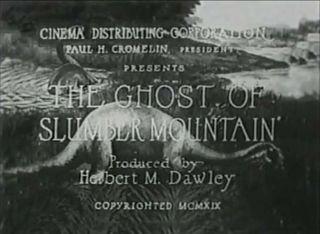
The “plot”: An explorer discovers a telescope that enables him to see back in time to age of the dinosuars.
The plot device: For such an early example of filmmaking this has a quite complex narrative structure. It begins with the explorer relating a tale from his past to two young boys, but then in the tale he falls asleep and has a dream adventure. So it’s a tale within a tale, within a fictional film.
Cheese before bed? This was a short film made by Ray Harryhausen’s future mentor, Willis O’Brien (most famous for creating the stop motion FX in King Kong ) so no surprise there are animated dinosaurs here. There’s also the ghost of a mad old hermit, played by O’Brien himself.
Any hints it’s more than just a flight of fancy? Not much of the film actually still exists any more, so it’s difficult to say for certain, but all the fantasy elements of the film take place in the dream sequence so the story telling sections could be a “true” account. But for the sake of this feature: it isn’t, okay?!
.
.
The 5,000 Fingers Of Dr T (1953)
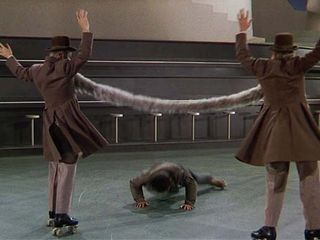
The “plot”: In the only film ever written by Cat In The Hat ’s Dr Suess (he also wrote the songs), a boy who hates his piano lessons enters a fantasy world where his piano teacher is an evil dictator with a bizarre castle who kidnaps children who are forced to play music for him.
The plot device: The boy, Bart, dreams the whole thing, but in true Wizard Of Oz style, people from his real life turn up in his fantasy.
Cheese before bed? Sadly Dr T (short for Terwilliker) doesn’t have 5,000 fingers (trading standards should look into this); instead the title refers to the fact that he needs 500 children to play his giant piano. The film also boasts a pair of rollerskating henchmen who share a beard and some seriously weird, expressionistic sets. Which all sounds fab, but it is, in fact, deathly dull.
Any hints it’s more than just a flight of fancy? Nah. Bart’s just got a seriously overactive imagination.
.
.
Click (2006)
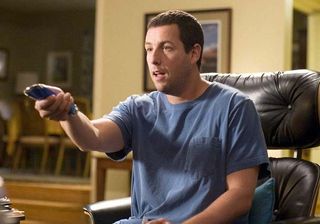
The “plot”: Fed up with having too many remote controls in his life, Michael buys a universal remote to control everything. And it does control everything – he discovers he can skip and fast forward through his life. In doing so he learns valuable life lessons, and the audience feels like throwing up at this vile techie version of It’s A Wonderful Life .
The plot device: It was all a dream, but one that saves Michael thousands in shrink fees.
Cheese before bed? Adam Sandler in a fat suit is far more freaky than any of the time jumps.
Any hints it’s more than just a flight of fancy? Yeah. After he wakes up he discovers the remote control and a note from the guy who sold it to him in his dream. That’s almost profound, if profound meant, “what a lot of crock”.
.
.
The Cabinet Of Dr Caligari (1920)
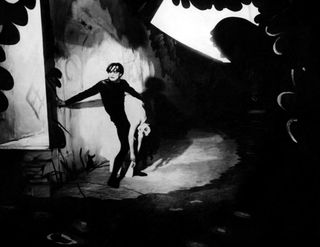
The “plot”: Carnival performers Dr Caligari and his somnambulistic, prescient sidekick Cesare are, in fact, serial killers, in this masterpiece of German expressionism.
The plot device: It’s all the deranged rantings of an inmate in a lunatic asylum… well, that’s what it was after the producers had their way, anyway. They thought the original ending was too grotesque and so imposed upon the director Robert Weine the idea that everything turns out to be the narrator’s delusion.
Cheese before bed? It’s German expressionism, what do you think? The whole thing looks like a chessboard in a distorting mirror. When you’re drunk.
Any hints it’s more than just a flight of fancy? Not after the producers had their way, but in the original, it’s clear that Caligari and Cesare were real and were responsible for a number of deaths.
.
SFX Magazine is the world's number one sci-fi, fantasy, and horror magazine published by Future PLC. Established in 1995, SFX Magazine prides itself on writing for its fans, welcoming geeks, collectors, and aficionados into its readership for over 25 years. Covering films, TV shows, books, comics, games, merch, and more, SFX Magazine is published every month. If you love it, chances are we do too and you'll find it in SFX.
Most Popular



